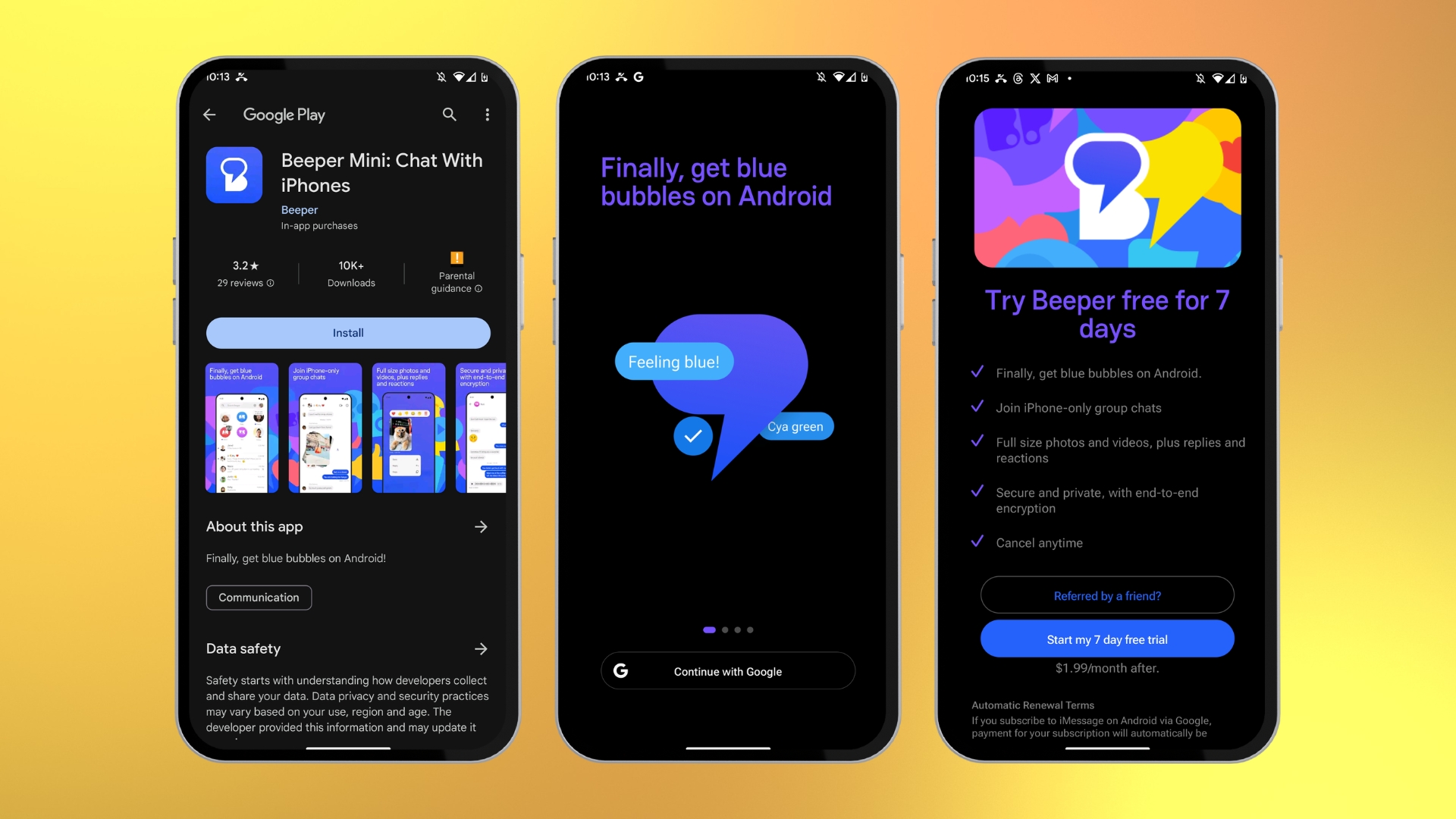Strength in numbers: Tech advocacy groups contact U.S. department of justice and call for antitrust probe of Apple
Tech Oversight Projects and Demand Progress are two of 16 organizations calling for action.

This past Wednesday, a letter was sent to the U.S. Department of Justice calling for “antitrust enforcement against Big Tech companies.” It also urged “the Department to file an antitrust lawsuit against Apple with haste” in order to fight an abuse of power: “Apple is once again in the news for abusing its power to stifle competition and protect its famed ‘walled garden.’”
The charge was that Apple had blocked the iMessage app for Android, Beeper Mini, which “deployed technology to bridge the ‘blue bubble/green bubble’ messaging gap for non-iPhone users.” It’s a story we’ve been following for some time.
The letter was addressed to the U.S. Attorney General Merrick Garland and the Deputy Attorney General Lisa Monaco. But one interesting thing about the letter is that it was signed by more than a dozen tech advocacy groups.
But what exactly do these groups stand for? What’s their mission? To give you an idea, here are some descriptions of a few that signed the letter, as well as links to those organizations' websites:
The Tech Oversight Project: This group states that the project “is charged with holding Big Tech accountable for its anti-competitive and corrupting influence on our society and the levers of power. To achieve this, the Tech Oversight Project will engage with key lawmakers and decision-makers to punch back against false narratives, expose bad actors in tech who are harming our country, and push for landmark antitrust legislation to restore competition and normalcy in our everyday lives.”
Accountable Tech: On this groups About webpage, it states: “Big Tech companies create products that are not fundamentally designed to serve the public good, but rather to generate profit. We’re here to change that…. Our mission is to curb the societal harms driven by Big Tech’s toxic business practices. We believe that oversight is critical for corporate accountability and democracy, competition is essential to prevent unchecked monopoly power, and that human-centered design should be at the forefront of both product development and policy making.”
Demand Progress: “Our Mission is to protect the democratic character of the internet—and wield it to contest concentrated corporate power and hold government accountable.” It also states that they “work to secure progressive policy changes for everyday people by organizing broad grassroots campaigns, leading smart lobbying initiatives, and leveraging our staff’s policy expertise.”
iMore offers spot-on advice and guidance from our team of experts, with decades of Apple device experience to lean on. Learn more with iMore!
Main Street Alliance: On the websites, Vision page, it reads, “At Main Street Alliance, we're committed to unlocking the leadership potential of small business owners. Our vision is a future that champions equitable job opportunities, community growth, and social fairness. We aim to: educate, organize, and run!” Below this statement, there are four subsections: “Foster the leadership skills of small business owners, encourage critical examination of existing economic policies, and promote alternative approaches for a balanced and fair economy…. Organize small business owners, lead policy-winning campaigns to decentralize economic and political power, establish public goods, and build a stronger foundation for future victories…. Conduct research and disseminate evidence highlighting the ripple effect of a fair economy that bolsters small businesses and fosters healthier communities…. Reframe the public narrative to challenge stereotypes about small business owners regarding race, class, gender, and motivations. We aim to amplify the voices of small business owners, highlighting their values and experiences.”
Can progressive tech organizations effectively fight large tech companies?
NextGen Competition: On this organization’s Priorities page, it reads, “Ending Bad Business Practices: Our work focuses on protecting consumers and employees while holding Big Tech accountable by shining a light on business practices that: Violate consumer privacy; Limit consumer choice through industry consolidation; Hinder a worker’s ability to organize; Encourage and enable worker harassment;” and “Empower dictators and despots.”
RootsAction.org: The About section of this website states, “RootsAction was founded in 2011 by two longtime progressive advocates and journalists, Norman Solomon and Jeff Cohen, and quickly grew…. RootsAction is dedicated to galvanizing people who are committed to economic fairness, equal rights for all, civil liberties, environmental protection -- and defunding endless wars. We mobilize on these issues no matter whether Democrats or Republicans control Washington D.C….”
The Freedom BLOC: “The Black Led Organizing Collaborative (BLOC) was created to build Black political power and to equip the Black community with capacity building tools through civic education, civic engagement, campaign management and leadership development that will ignite and foster greater electoral turnout in Cleveland, Columbus, as well as our historical urban centers in Northeast (Youngstown and Akron). BLOC is the vehicle for collective political expression, educating the Black electorate and the broader Black community on issues impacting their lives and mobilizing them to turnout to vote on issues and candidates that support and enforce equitable policies for Black Ohioans.”
Why is it important that progressive tech advocacy groups, like the 16 listed on the letter, join the push for an antitrust probe against Apple?
The U.S. has a long history of bringing various groups together to assist in social and political causes. For instance, in the 1960s, five groups, which is know as “Big Five”—The Southern Christian Leadership Conference (SCLC), the National Association for the Advancement of Colored People (NAACP), the National Urban League (NUL), the Student Nonviolent Coordinating Committee (SNCC), and the Congress on Racial Equality (CORE)—combined forces to fight for civil rights throughout the nation.
And while the 16 organizations may have different, specific agendas, they, like the Big Five, seem keen on combining forces when necessary to fight for what it considers the greater good.

Terry Sullivan has tested and reported on many different types of consumer electronics and technology services, including cameras, action cams, mobile devices, streaming music services, wireless speakers, headphones, smart-home devices, and mobile apps. He has also written extensively on various trends in the worlds of technology, multimedia, and the arts. For more than 10 years, his articles and blog posts have appeared in a variety of publications and websites, including The New York Times, Consumer Reports, PCMag, Worth magazine, Popular Science, Tom’s Guide, and Artnews. He is also a musician, photographer, artist, and teacher.
